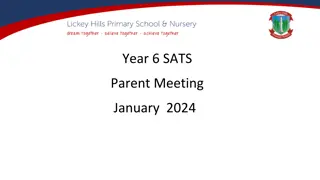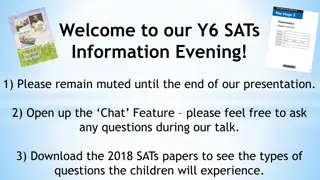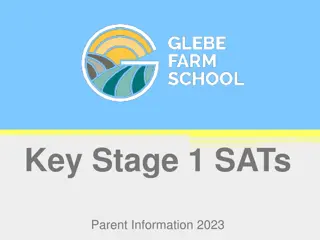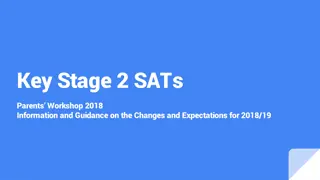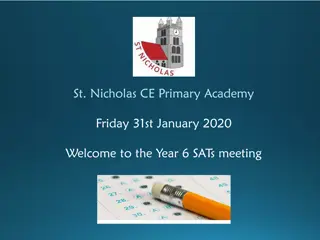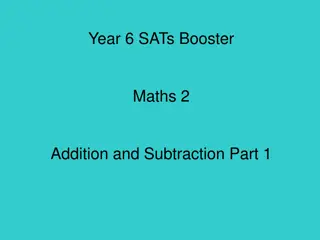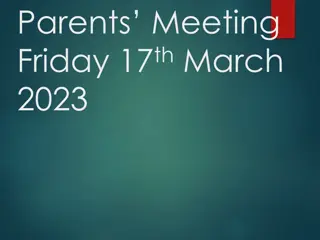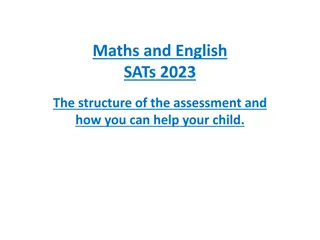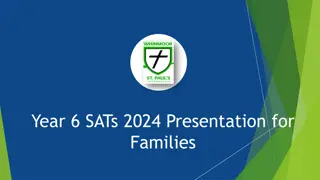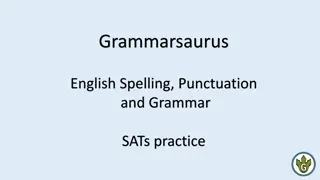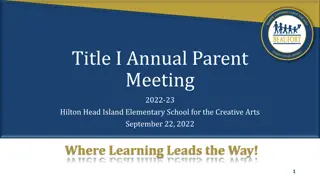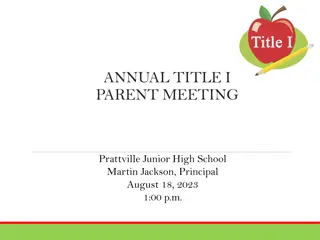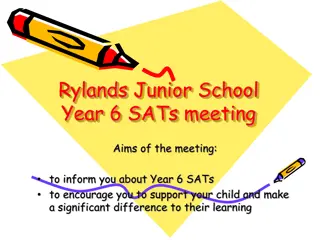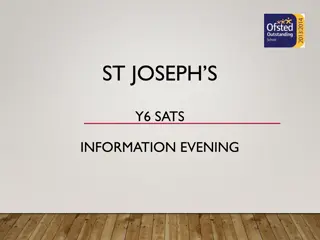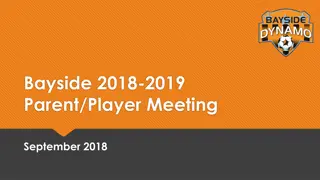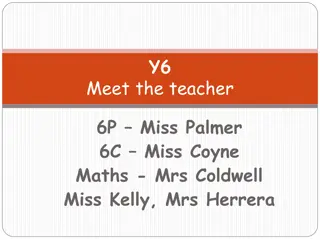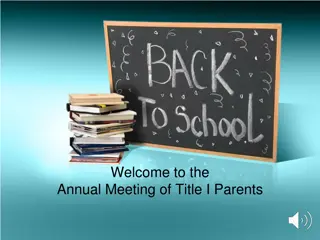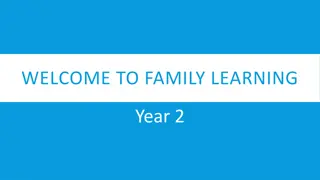
Key Areas to Help Your Child Prepare for SATs Tests
Discover the test arrangements, preparation tips, and what your child should focus on for the SATs tests. Learn about the test content, reading comprehension format, and ways to support your child at home. Find out about the specific tests your child will sit and explore useful online resources for assistance.
Download Presentation

Please find below an Image/Link to download the presentation.
The content on the website is provided AS IS for your information and personal use only. It may not be sold, licensed, or shared on other websites without obtaining consent from the author. If you encounter any issues during the download, it is possible that the publisher has removed the file from their server.
You are allowed to download the files provided on this website for personal or commercial use, subject to the condition that they are used lawfully. All files are the property of their respective owners.
The content on the website is provided AS IS for your information and personal use only. It may not be sold, licensed, or shared on other websites without obtaining consent from the author.
E N D
Presentation Transcript
Session aims To explain the test arrangements. To discuss test preparation and what we are doing as a school Highlight some key areas for helping your child. Outline the timetable for the week in May.
What tests will my child sit? Reading comprehension 1 paper GPAS (Grammar, Punctuation and Spelling) - 2 papers Three Mathematics papers - 1 Arithmetic and 2 Reasoning papers All children taking the tests will sit the same papers For some children, the tests are not appropriate. These children will be assessed by their teachers and this is the data that will be submitted. If this applies to your child, it will be discussed with you at parent's evening next half term.
Content of the SATs It is not just Year 6 learning that is being assessed. The content of the tests is, broadly speaking, based on 50% content from Years 3, 4 and 5 learning and 50% Year 6. It is an assessment of their whole Key Stage 2 learning
Reading Test Format a comprehension paper - 1 paper for all children answer a range of questions on different types of text (both fiction & non-fiction) 1 hour to read the texts and answer the questions Children will be marked as either working at National Expectations or Below National Expectations. Children achieving a high score will be judged as working at a higher standard
Reading: Supporting at home Read WITH your child as often as you can- everyday for ten minutes in a quiet comfortable space Support them by asking them questions. Explore unfamiliar language with them don t just let them read over it without understanding. Making sure they read with an awareness of the punctuation; encourage and model reading with expression and intonation some children need to slow down New section on the school website: This contains some reading extracts and test style questions for those children wishing to do some additional practice. To access click on the link below or visit the Year 6 section of the school website: Click here (then click on Reading in the task bar)
Reading: Useful websites to support your child with preparing for the SATs: https://uk.ixl.com/english/year-6
Grammar, Punctuation and Spelling
GPaS Test Format Split into two components:
GPaS Test Format There is a greater focus on knowing grammatical vocabulary - e.g. verb, semi-colon, contraction, relative clause Spelling patterns will form the spelling tests Children will be marked as either working at National Expectations or Below National Expectations. Children achieving a high score will be judged as working at a higher standard
GPaS: Supporting at home spag.com: Your children all have an individual login. Click on the link below and ask your children to login . They can then take short tests to practise their skills Click here Homework: Learning weekly spellings New section on the school website: This contains some test style questions and revision guides for those children wishing to do some additional practice. To access click on the link below or visit the Year 6 section of the school website: Click here (then click on Grammar, Punctuation and Spelling in the task bar)
GPaS: Useful websites to support your child with preparing for the SATs: https://www.topmarks.co.uk/english-games/7-11-years/spelling- and-grammar http://www.primaryhomeworkhelp.co.uk/literacy/index.htm https://www.educationquizzes.com/ks2/english/ https://uk.ixl.com/english/year-6
Test format: Paper 1-Arithmetic 36 questions to be answered in 30 minutes speed is key! No contextualised questions (worded questions) Most efficient method needed work quickly and carefully. Can we work it out mentally before doing a column method?
Test format: Papers 2 and 3 - Reasoning Each one is 40 minutes long No calculators allowed Children must show their working out when asked to as they can get marks for their method, even if they do not get the final answer correct Scoring: Children will be marked as either working at National Expectations or Below National Expectations. Children achieving a high score across the three papers will be judged as working at a higher standard
Maths: Supporting at home Practise and repetition is crucial in Maths so that key number strategies and skills become second nature. Children become confident and fluent: Timetables: The key to so much! Practice everyday! TTRockstars School Website: The Mathematics section of the school website has all the calculation policies, knowledge organisers and expectations for Years 3-6. Revise from all year groups in Key stage 2, not just Year 6. Click on the link below: Click here School Website: The Year 6 SATs revision section has some test style questions for both arithmetic and reasoning and revision guides for those children wishing to do some additional practice. To access click on the link below or visit the Year 6 section of the school website: Click here (then click on Maths in the task bar)
Maths: Useful websites to support your child with preparing for the SATs: https://www.educationquizzes.com/ks2/maths/ https://www.bbc.co.uk/bitesize/subjects/z826n39 https://uk.ixl.com/maths/year-6 http://www.primaryhomeworkhelp.co.uk/maths/inde x.html
What school is doing to support your child: Test confidence and preparation During Year 6 your children will have three practice SATs sessions in the hall the end of the Autumn term (took place in December), the middle of the Spring term and the end of the Spring term. Your child's progress and performance will be tracked and gaps in learning identified. The Year 6 teachers have been using this test analysis to plan lessons for your children and to select children who need intervention sessions to help them achieve the expected standard The aim of these practice sessions is also to prepare children emotionally and give them confidence. In May it will be an experience they are used to.
SATs practice week 2: week commencing 5th February 2024 Date Papers Monday 5th February (am) English Grammar, Punctuation and Spelling Paper 1: short answer questions English Grammar, Punctuation and Spelling Paper 2: spelling English Reading: reading booklet and associated answer booklet Tuesday 6th February (am) Wednesday 7th February (am) Mathematics Paper 1:Arithmetic Mathematics Paper 2: Reasoning Thursday 8th February (am) Mathematics Paper 3: Reasoning
SATs practice week 3: week commencing 18th March 2024 Date Papers Monday 18th March (am) English Grammar, Punctuation and Spelling Paper 1: short answer questions English Grammar, Punctuation and Spelling Paper 2: spelling English Reading: reading booklet and associated answer booklet Tuesday 19th March (am) Wednesday 20th March (am) Mathematics Paper 1:Arithmetic Mathematics Paper 2: Reasoning Thursday 21st March (am) Mathematics Paper 3: Reasoning
What school is doing to support your child: Test confidence and preparation There is no expectation that children will have been passing the tests from December onwards. What we are looking for is an improvement in scores during the 3 test weeks getting closer and closer to the expected standard. If you did not attend parents evening yesterday, please book time either before or after school before we break up for half term.
What school is doing to support your child: Additional support and intervention Since the start of Year 6 SATs preparation has been underway: Autumn term: Year 6 additional support in the afternoons: Reading and Maths interventions with identified children. Test style questions have been dripped into lessons on a daily basis. Weekly arithmetic tests and speed reads
What school is doing to support your child: Additional support and intervention Spring term: Booster Sessions: An opportunity to brush up on exam technique. Your child will have been invited to attend. Starting next week, Monday 5th February 3:15 - 4:00pm. The focus will be a balance of Reading and Maths. This will continue to take place up until the week before SATs. Year 6 additional support to continue to run in the afternoons
Pupils with specific needs Pupils with specific needs may need additional arrangements so they can take part in the KS2 tests. The school is able to consider support for pupils in accordance with guidelines issued by the Standards and Testing Agency - Access arrangements. Access arrangements are primarily based on normal classroom practice, so we should already be aware of any specific needs. Support can include the following: readers, prompters, testing in a different room, rest breaks and extra time. Access arrangements should neither advantage nor disadvantage a pupil.
Year 6 SATs 2024 When is it happening?
SATs Week Timetable 2024 Date Monday 13th May Papers English Grammar, Punctuation and Spelling Paper 1: short answer questions English Grammar, Punctuation and Spelling Paper 2: spelling Tuesday 14th May English Reading: reading booklet and associated answer booklet Wednesday 15th May Thursday 16th May Mathematics Paper 1: Arithmetic Mathematics Paper 2: Reasoning Mathematics Paper 3: Reasoning
What can you do before SATs week to help. Encourage and support your child with their completion of any home learning set by school. Remember, there is extra on the school website if required; Make sure your child reads regularly and ask them questions about what they have read; Help your child to learn their times tables and weekly spellings; Avoid taking a holiday between now and mid-May; Ensure your child attends school and does not have any unnecessary days off.
What can you do during SATs week to help. Ensure your child has plenty of sleep Get them to school on time so they are not rushed and worried Please don t book a holiday during SATs week No appointments during SATs week please!!! Keep their normal routines e.g.: attendance at clubs
What can you do before and during SATs week to help. Consider your child s emotional well being: Do not over mention SATs - this can very easily cause tension and stress. Your children can still work really hard at home and school with their learning, practising and revising, without even mentioning the word! If your child gets stressed and worried, it can have a negative impact on their performance. Remain positive and praise your children. If a child has a positive attitude, feels they are doing well, they will have a better chance of success!
Your children have logins for the following: www.spag.com www.ttrockstars.com https://www.purplemash.com/login/ The New SATs revision section of the school website can be accessed by: Curriculum > Year 6 > Year 6 SATs Revision Thank you for taking the time to attend this session. We hope it has given you an insight into SATs week and given you some ideas on how to help at home. Remember your child's class teachers are available at the beginning and end of every day to talk through any or your questions, concerns or worries We will have a short final reminder SATs meeting just before the actual SATs week in May.
Sample Questions- Reading
Example question: Retrieval The Russian Space Agency offers flights on board a spacecraft to the International Space Station (ISS), where people can stay. The ISS was built in 1998 and is so big that it can be seen from Earth. Tickets to the ISS are very limited How can you tell that the International Space Station is very large? Answer: You can see it from earth
Example question: Make inferences from the text How would you like it Supposing that you were a snail, And your eyes grew out on threads, Gentle, and small, and frail If an enormous creature, Reaching almost up to the distant skies, Leaned down, and with his great finger touched Your eyes Just for the fun Of seeing you snatch them suddenly in And cower, quivering back Into your pitiful shell, so brittle and thin? Would you think it was fun then? Would you think it was fun? Gentle, and small, and frail How do these words make the reader feel about the snail? Answer: sorry for it/ worried about it or angry for it/ upset about what's happening
Example question: Explain the meaning of words in context How would you like it Supposing that you were a snail, And your eyes grew out on threads, Gentle, and small, and frail If an enormous creature, Reaching almost up to the distant skies, Leaned down, and with his great finger touched Your eyes Just for the fun Of seeing you snatch them suddenly in And cower, quivering back Into your pitiful shell, so brittle and thin? Would you think it was fun then? Would you think it was fun? Into your pitiful shell, so brittle and thin In this line, the word brittle is closest in meaning to shiny, soft, delicate, rough Answer: delicate
Sample Questions- GPaS
Sample Questions- Maths
Arithmetic - Example Questions: these will be taken from the Year 3- Year 6 curriculum Key: Know the basics really well 499 + 1= 309-10= 23 x 0= 63 9= 96 x 5= 436-8= 2/5 of 45 = 10,025 - 448 = 12% of 600
Reasoning- Example Questions: these will be taken from the Year 3- Year 6 curriculum
Reasoning- Example Questions: these will be taken from the Year 3- Year 6 curriculum


